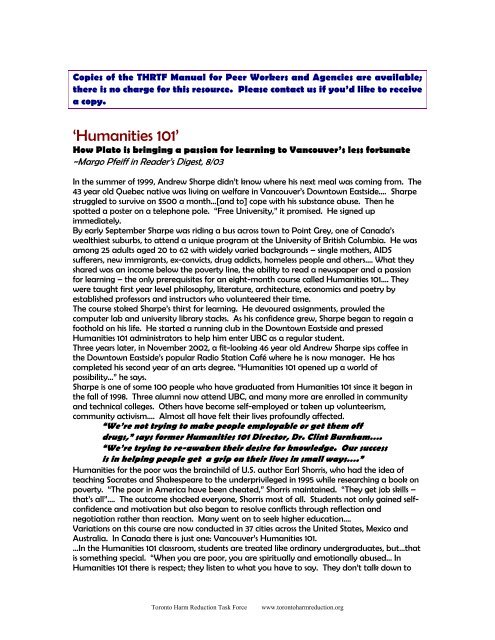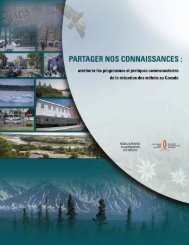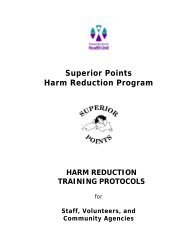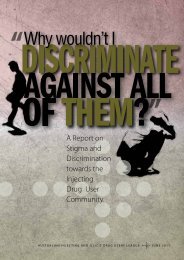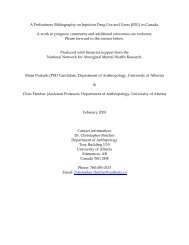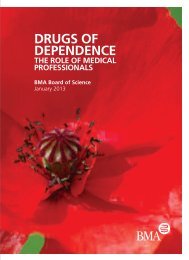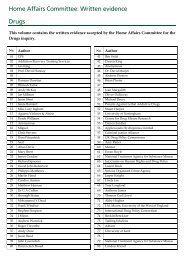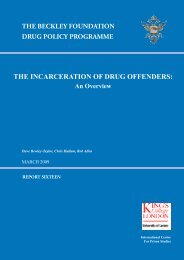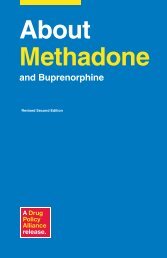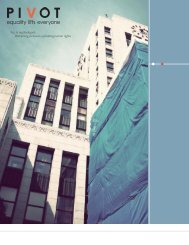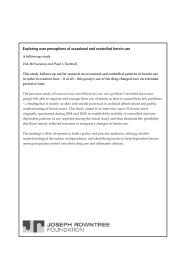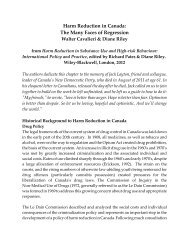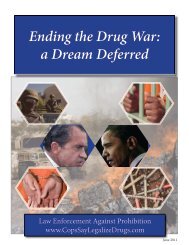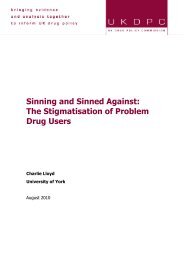Many people might not acknowledge or comprehend what we -- peers, or users, or exusers;must continually face: that our ‘circle’, our ‘inner sanctum’, our ‘hood’ is smaller than onemight think. And for obvious reasons: using illicit drugs, by definition, is illegal! It is much safer fora drug user to purchase drugs from a ‘reputable’ dealer; one s/he has bought from in the past;rather than risk exposure through a stranger to a potential narc. Also, a basic HR tenet is to limityour suppliers not only to protect your exposure to Johnny Law, but also the hospital emergencyroom or welfare line, as different dealers may sell with different ‘cuts’, or additives, or quality, tosay nothing about getting ‘vic-ed’ (getting ripped-off from a dealer who you don’t know, and whodoesn’t know you). Being a good drug dealer in one respect means being a prolific one. But thatmeans it may be possible, in fact, probable, that the peer and the service community would sharea dealer.Therefore service provision from peer workers is often much more complicated,befuddling, and confused than the relative ‘cut and dried’ boundaries of our counter-parts, serviceproviders coming from the educated social-service field, and not being a part of the drug usingcommunity. We often live and use within the same community in which we are also serviceproviders. If we didn’t, our effectiveness as peers would be greatly diminished.I remember working at a youth agency when I first got into this type of work. It was aChristian organization, and one for which I had a lot of respect. I felt somewhat privileged when Ifirst started working there, without any other qualifications than my ‘sordid’ past. Affectionately,and somewhat appropriately, I was nick-named by many youth and some of the staff as “theworlds oldest street-kid”.Very early in my ‘peer career’, one of my first challenges involving ‘boundaries’ was witha young male whom I had a particular fondness for. I had also known, from my ‘old’ yahoo days,his father, as well as a couple of his uncles (in fact, I had done time with one of them). Truth betold, the kid reminded me a little of myself as a youth. After assisting him with an employmentsearch he finally got a job interview! I may have been just as excited as he was!The problem was, he didn’t really have much in the line of presentable clothing. So Imade arrangements with him to meet him after work, and gave him some old clothes I had, aswell as a pair of shoes, two bus tickets, and a few bucks. The money or the clothing WAS NOT aloan but a gift (because I knew his father), and I made it quite clear that that was the case. I alsoagreed to hang on to his garbage bag of possessions until the next day after the interview…Now comes the crunch:Two days later the youth comes in to the agency, excited about starting his new job laterin the week. He mentions that he needs to come over to my apartment after work to get his stuff.One of the staff overhears, and the next thing I know, I receive a call to meet the “Big Boss” in the‘office upstairs’Most folks can probably guess what happened next: the discussion on healthyboundaries; the gift of the money; having the youth accompany me home to retrieve hispossessions; etc etc etc. Don’t get me wrong: the tone of the boss’s speech wasn’t punitive ordisciplinary. It was more like an Anthony-Robbins-type info-mercial for social work success! Ilearned much that day about ‘boundary etiquette’. After the lecture, I was offered the chance toask questions.Now I had just received a flurry of excellent information, and was trying to absorb andassimilate it, and wasn’t really ready to respond, so my eyes wandered to an embroidered plaqueon her wall which read, “ WWJD?”. (for my secular friends: “What Would Jesus Do?”).My Boss noticed this and, suddenly, it felt that a certain onus, or burden had passed fromme, the ‘peer’, to my Boss, the service provider in a ‘Christian’ agency (that whole: do unto othersas you would have them do unto you!). Suddenly, the excellent social work info-mercial I had justminutes before listened to became just a tad surreal; a philosophical dilemma/potato. Withoutbelabouring this any further, my Boss then closed her office door, gave me a hug, and confidedthat had she been in my shoes, she would have likely done the very same thing I had, and that inthe past she had done similar.What was only 15 minutes before clearly defined, clearly outlined, clearly clear, becameclear as mud.As is much of the work of a peer in harm reduction.Toronto <strong>Harm</strong> <strong>Reduction</strong> Task Forcewww.torontoharmreduction.org
Copies of the THRTF Manual for Peer Workers and Agencies are available;there is no charge for this resource. Please contact us if you’d like to receivea copy.‘Humanities 101’How Plato is bringing a passion for learning to Vancouver’s less fortunate~Margo Pfeiff in Reader’s Digest, 8/03In the summer of 1999, Andrew Sharpe didn’t know where his next meal was coming from. The43 year old Quebec native was living on welfare in Vancouver’s Downtown Eastside…. Sharpestruggled to survive on $500 a month…[and to] cope with his substance abuse. Then hespotted a poster on a telephone pole. “Free University,” it promised. He signed upimmediately.By early September Sharpe was riding a bus across town to Point Grey, one of Canada’swealthiest suburbs, to attend a unique program at the University of British Columbia. He wasamong 25 adults aged 20 to 62 with widely varied backgrounds – single mothers, AIDSsufferers, new immigrants, ex-convicts, drug addicts, homeless people and others…. What theyshared was an income below the poverty line, the ability to read a newspaper and a passionfor learning – the only prerequisites for an eight-month course called Humanities 101…. Theywere taught first year level philosophy, literature, architecture, economics and poetry byestablished professors and instructors who volunteered their time.The course stoked Sharpe’s thirst for learning. He devoured assignments, prowled thecomputer lab and university library stacks. As his confidence grew, Sharpe began to regain afoothold on his life. He started a running club in the Downtown Eastside and pressedHumanities 101 administrators to help him enter UBC as a regular student.Three years later, in November 2002, a fit-looking 46 year old Andrew Sharpe sips coffee inthe Downtown Eastside’s popular Radio Station Café where he is now manager. He hascompleted his second year of an arts degree. “Humanities 101 opened up a world ofpossibility…” he says.Sharpe is one of some 100 people who have graduated from Humanities 101 since it began inthe fall of 1998. Three alumni now attend UBC, and many more are enrolled in communityand technical colleges. Others have become self-employed or taken up volunteerism,community activism…. Almost all have felt their lives profoundly affected.“We’re not trying to make people employable or get them offdrugs,” says former Humanities 101 Director, Dr. Clint Burnham….“We’re trying to re-awaken their desire for knowledge. Our successis in helping people get a grip on their lives in small ways….”Humanities for the poor was the brainchild of U.S. author Earl Shorris, who had the idea ofteaching Socrates and Shakespeare to the underprivileged in 1995 while researching a book onpoverty. “The poor in America have been cheated,” Shorris maintained. “They get job skills –that’s all”…. The outcome shocked everyone, Shorris most of all. Students not only gained selfconfidenceand motivation but also began to resolve conflicts through reflection andnegotiation rather than reaction. Many went on to seek higher education….Variations on this course are now conducted in 37 cities across the United States, Mexico andAustralia. In Canada there is just one: Vancouver’s Humanities 101.…In the Humanities 101 classroom, students are treated like ordinary undergraduates, but…thatis something special. “When you are poor, you are spiritually and emotionally abused… InHumanities 101 there is respect; they listen to what you have to say. They don’t talk down toToronto <strong>Harm</strong> <strong>Reduction</strong> Task Forcewww.torontoharmreduction.org


